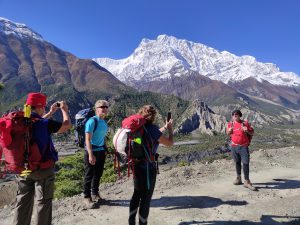
The most popular definition of democracy is the one by Abraham Lincoln, the 16th president of the United States. “Democracy is a government of the people, by the people, and for the people.” Simply, it can be understood that democracy is a system of government where the lawmakers are elected by the people among themselves, the theory of separation of power is exercised well and rule of law is prevailing.
After the period of renaissance and reformation in the 17th century, the democratic system of governance began to evolve and today, in the 21st century, democracy is the most practised and popular system of governance.
Here too, a democratic government exists as mentioned by the constitution of Nepal, but people are still not happy with the state of democracy in Nepal. So what is next?
Struggles for democracy in Nepal
Efforts to establish democracy in Nepal have not been easy. Even after rooting out the Ranas in 1951, the power struggle continued between King Mahendra and banned political parties here during 30 years of the Panchayat system. The people’s movement that was held in 1990 put an end to the Panchayat system of governance and a new constitution was made.
Yet, various problems came out including a decade-long armed war that jeopardised democracy in Nepal. Then the 2006 people’s movement ended the war and overthrew the monarchy, paving the way for the elections of the constituent assembly. The constitution was finally made by the constituent assembly elected by the people and promulgated on September 20, 2015. The country’s democratic dream came true after seven decades of continuous struggle.
The new constitution of Nepal ensured democracy in Nepal with the theory of separation of power and rule of law to be followed properly to ensure constitutional supremacy. Article 4 of the constitution mentioned that Nepal is a socialist-oriented state, but the people of Nepal are yet not happy as the country lags way behind in economic prosperity.

Democracy in Nepal at present
Corruption has become one of the biggest challenges for democracy in Nepal as the country is ranked 110th among 180 countries as per the latest corruption report from Transparency International.
Similarly, the growth of digital democracy becomes an opportunity as well as a challenge. Undoubtedly, the rising usage of internet services and social media is spreading more awareness, but people are easily provoked and fake news is easily spread.
Due to the sadness caused by the failures of democracy in Nepal, people are easily getting provoked. When a person comes on social media and scolds politicians with aggression using fancy words, people easily believe that everything said by that person is true and begins following him/her despite their unknown background. Situations like these are a massive threat to democracy; political parties are responsible for this.
For strengthening democracy, the strengthening of democratic institutions is necessary, but democratic institutions including constitutional bodies and judicial bodies are getting weak because of political influences and the unhealthy struggle for power among the parties.
Remittance is the pillar of the Nepali economy for a very long and this does not seem to change very soon. People are compelled to spend the energetic periods of their lifetime working abroad just to provide quality education and mediocre health services to their family members. Is this the socialism our constitution talks about? Is this the socialism that people imagined while participating in revolutions? Is this democracy in Nepal?
Way forward

Democracy in Nepal needs an overhaul. But, how?
First of all, instead of getting into the trap of crony capitalism, the political parties should quickly behave to move the country on the path of socialism to make democracy stronger. The leadership who failed to do so should be replaced as soon as possible.
The same person should be restricted from going into the same position again and again. Democratic institutions should be able to work freely without any influence. As the fault is seen from the party conventions, the adoption of the one person: one post principle can be a game-changer.
For instance, if we deprive the party presidents of the executive posts and appoint those persons who are not the position-holders in the party committees, the check and balance will become easy. The party committee can check the government and recall the wrong-doers easily as there is nobody from the party committee in the government.
Similarly, when political parties promote entrepreneur cadres instead of full-time cadres, the economic expectation of party cadres from their leaders can be minimised. This can be another significant move in controlling corruption and achieving national prosperity as institutional corruption is common today only to provide an economic advantage to party cadres.
Nowadays, when we talk about development, we often hear about the US or Europe. Leaders are even trying to impose their development model here in our country, but we should have our own development model to achieve prosperity and strengthen democracy in Nepal.
With less than five per cent of the world’s population, the US consumes 17 per cent of the world’s energy. What happens when India and China, who account for roughly 36 per cent of the world’s population, start adopting the US development model?
So, a development model based on small agricultural and cottage industries should be made instead of copying the technology of westerners. This suits our economy and lifestyle. While talking about economic growth and sustainable development, the rational use of natural resources should not be forgotten.























